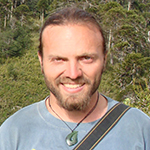
LEMMA Team Detail
 | Cameron Naficy Research Associate Research Ecologist Dept. of Forest Ecosystems and Society Oregon State University | Mailing address: Department of Forest Ecosystems & Society Phone:Oregon State University 321 Richardson Hall Corvallis, OR 97331 (541) 737-6097 Email: |
Educational Background
B.A., 2003 (ecology and evolutionary biology), Rice University, Houston,TX
M.Sc., 2008 (organismal biology & ecology), University of Montana, Missoula,MT
Ph.D., 2017 (geography), University of Colorado, Boulder, CO
Research Interests
Landscape and disturbance ecology (especially fire and insects); ecological tipping points, feedbacks and resilience; historical ecology; dendroecology; forest mortality processes; ecophysiological responses to interacting drought and disturbance; photogrammetry; integration of remote sensing data at multiple scales to address fine- to meso-scale forest dynamics; development of image processing and feature extraction workflows for archival imagery; forest policy & management; ecological restoration of temperate forests and montane grasslands.
Biography
Cameron joined LEMMA in 2020 to work on integration of multiple data types (high-resolution aerial imagery, photogrammetric point clouds, airborne lidar, and moderate resolution imaging spectroscopy) into forest monitoring approaches, especially in relation to forest disturbances. Prior to this, he was a joint postdoctoral research scientist from 2017-2020 in the departments of Forest & Conservation Sciences and Forest Resource Management at the University of British Columbia in Vancouver. His work there integrated dendroecological techniques, historical aerial imagery and photogrammetric points clouds to examine the fire regime dynamics and landscape patterns of vegetation in lodgepole pine forests of the eastern Rockies, Alberta subjected to frequent historical fire. This work built on his previous research throughout the northern U.S. Rockies to develop methods for integrating multiple historical data types and statistical modeling to improve our understanding of historical fire severity and severity-mediated forest dynamics. He has also used fine-scale remote sensing to reveal landscape patterns of delayed post-fire tree mortality in Glacier National Park and field-based manipulative experiments to evaluate ecophysiological responses and mortality thresholds of multiple tree species in Patagonia to drought and increased temperature. Outside of work, Cameron enjoys backpacking, camping, hiking, canoeing, gardening, native plant raising and restoration, chopping wood, and spending time with his family and friends.